
The 10th BRICS Parliamentary Forum, held in St. Petersburg from July 11-12, brought together representatives from member countries to discuss a wide range of issues crucial to their collective and individual economic strategies. Among the topics discussed, de-dollarisation emerged as a central theme, Tasnim reports.
De-dollarisation refers to the process of reducing reliance on the US dollar for international transactions and reserves. This shift is driven by several factors, including geopolitical tensions, the desire for greater economic sovereignty, and the need to mitigate the risks associated with the dollar’s dominance in the global financial system. For the BRICS nations, de-dollarisation is seen as a pathway to greater financial stability and autonomy.
During the forum, each member country highlighted its perspectives and efforts regarding de-dollarisation. Russia, facing extensive Western sanctions, has been particularly vocal about the need to move away from the dollar. Russian representatives emphasised their ongoing initiatives to increase the use of the ruble and other national currencies in bilateral trade agreements. They pointed to recent deals with countries such as China and India, where trade is increasingly conducted in local currencies.
China, with its rapidly growing economy and global trade influence, also underscored its commitment to promoting the yuan as an international currency. Chinese delegates discussed their strategies for expanding the yuan’s role in global trade, including the establishment of yuan-denominated oil contracts and the Belt and Road Initiative, which facilitates trade and investment in local currencies among participating countries. China’s extensive economic ties with other BRICS nations and developing countries make it a pivotal player in the de-dollarisation agenda.
India, another key BRICS member, shared its efforts to diversify its foreign exchange reserves and increase the use of the rupee in international trade. Indian representatives highlighted recent agreements with countries like Iran and the UAE to trade in local currencies, reducing reliance on the dollar. Additionally, India is exploring digital currencies as a means to further enhance its financial independence and streamline cross-border transactions.
South Africa and Brazil also contributed to the discussions, emphasising regional cooperation and the importance of strengthening financial institutions within the BRICS framework. South Africa’s representatives pointed to the African Continental Free Trade Area (AfCFTA) as an opportunity to boost intra-African trade using local currencies, while Brazil discussed its initiatives to promote the real in trade with neighbouring countries in Latin America.
The forum concluded with a joint declaration emphasising the importance of de-dollarisation for the future economic stability and sovereignty of the BRICS nations. The declaration outlined several key measures to advance this agenda, including increasing the use of national currencies in trade, enhancing financial cooperation within the BRICS framework, and exploring the potential of digital currencies and blockchain technology.
In addition to the joint declaration, the forum established a working group to monitor and coordinate de-dollarisation efforts among member countries. This group will be tasked with identifying best practices, sharing experiences, and developing strategies to overcome challenges associated with reducing reliance on the US dollar.

